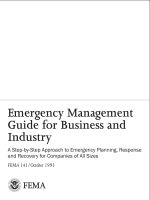Tài liệu HOTEL/RESTAURANT MANAGEMENT CAREER STARTER pot
Bạn đang xem bản rút gọn của tài liệu. Xem và tải ngay bản đầy đủ của tài liệu tại đây (718.32 KB, 239 trang )
HOTEL/RESTAURANT MANAGEMENT
CAREER STARTERHOTEL/RESTAURANT
MANAGEMENT
career
starter
Lauren Starkey
New York
Copyright © 2002 LearningExpress, LLC.
All rights reserved under International and Pan-American Copyright Conventions.
Published in the United States by LearningExpress, LLC, New York.
Library of Congress Cataloging-in-Publication Data:
Starkey, Lauren B., 1962–
Hotel/restaurant management career starter / Lauren B. Starkey.—1st ed.
p. cm.
ISBN 1-57685-411-6
1. Hotel management. 2. Restaurant management. I. Title.
TX911.3.M27 S6985 2002
647.94'068—dc21
2002001383
Printed in the United States of America
9 8 7 6 5 4 3 2 1
First Edition
ISBN 1-57685-411-6
For more information or to place an order, contact LearningExpress at:
900 Broadway
Suite 604
New York, NY 10003
Or visit us at:
www.learnatest.com
About the Author
Lauren Starkey is a writer and editor, specializing in educational and ref-
erence works, with over ten years of experience. For eight years, she worked
on the Oxford English Dictionary. She lives in Essex, Vermont, with her
husband, Gorden, and children, Emma, Graham, and Cameron.
Introduction Why Become a Hotel or Restaurant Manager? ix
Chapter One Choosing a Career as a Hotel 1
or Restaurant Manager
What is a Hotel or Restaurant Manager 2
What Do Hotel or Restaurant Managers Do? 3
What Makes a Great Hotel or Restaurant Manager? 5
Hiring Trends and Salaries 6
The Importance of Training 9
Where Do Hotel or Restaurant Managers Work? 11
Opportunities for Advancement 19
Certification 20
Skills Inventory 22
Chapter Two Getting the Education You Need 26
Why You Need Training 27
Types of Training Programs 28
Choosing a Training Program 39
Admission Requirements 47
Making the Most of Your Training Program 49
Chapter Three Financial Aid—Discovering the Possibilities 57
Some Myths about Financial Aid 58
Types of Financial Aid 60
Applying for Financial Aid 73
General Guidelines for Loans 79
The Most Frequently Asked Questions 83
about Financial Aid
Financial Aid Checklist 85
Contents
Financial Aid Acronyms Key 85
Financial Aid Terms—Clearly Defined 86
Financial Aid Resources 87
Chapter Four Finding Your First Job 94
What Kind of Job Do You Really Want? 95
Taking a Deadline-Oriented Approach 96
to Your Job Search Efforts
Researching the Field 97
Finding the Jobs Available 104
Networking 112
Chapter Five Job Search Skills 119
Writing Your Resume 120
Writing Cover Letters 146
Interviewing Successfully 150
Evaluating a Job Offer 158
Chapter Six Succeeding on the Job 163
Fitting Into the Workplace Culture 164
Managing Work Relationships 166
Stress on the Job 173
Managing Your Time 177
Mentors 180
Promoting Yourself 182
Moving On 187
Final Thoughts 189
Appendix A Professional Associations 193
Appendix B Additional Resources 195
Appendix C Directory of Accredited Schools, 203
National Accrediting Associations,
and Financial Aid by State
Appendix D Sample Free Application for Federal 219
Student Aid (FAFSA)
viii
Contents
ix
Why Become a Hotel or
Restaurant Manager?
HOTEL AND
restaurant managers work in the hospitality industry,
providing services to millions of people around the world every day. Most
people are familiar with the setting in which these managers work, having
enjoyed meals in restaurants and stayed in hotels. But how many know what
goes on behind the scenes? Depending on the size of the establishment,
there may be hundreds of people involved in the process of providing a hotel
room or restaurant meal.
Managers oversee the work of these people, coordinating a variety of
services including housekeeping, kitchen staff, marketing, inventory con-
trol, bookkeeping, and human resources. But they’re not just behind-the-
scenes people. Hotel and restaurant managers are generally “people
people.” They love contact with their guests, and enjoy providing the kind
of customer service that brings people back to their establishments over and
over again. This book introduces you to these exciting careers, in which you
might find yourself working for a huge city hotel, an ocean-side resort, a
contract food service company, an ethnic restaurant, or one of hundreds of
other employers.
Chapter 1 serves as a general exploration of the field. In it, you will learn
what hotel and restaurant managers do, where they work, and what makes
them successful. Also included are hiring trends and current salary informa-
tion, sample job descriptions, and advice from current hotel and restaurant
managers.
Chapter 2 explains the importance of training, and how to decide what
kind of post-secondary education is right for you. It explains the different
Introduction
types of programs and how to succeed once you have entered one. Sample
courses and tuition costs from schools across the country are also in this
chapter.
In Chapter 3, you will learn the possibilities for financing your education,
including loans, scholarships, and grants. The differences between each
option are explored, explaining eligibility, the application process, and how
awards are given. You will also find out about the forms you need, where to
get them, how to fill them out, and where to send them, and get some tips
for simplifying and surviving the process.
Chapter 4 covers the job search process, beginning with a discussion
about determining the type of job you really want. There is plenty of infor-
mation on where the best jobs are, and the best ways to find them, from clas-
sified ads to networking and Internet resources.
Then, in Chapter 5, you will learn how to hone your job search skills.
The crafting of winning resumes and cover letters that really get noticed is
explained, along with advice on how to handle interviews with more polish
and less anxiety. Finally, you will learn how to evaluate the job offers you are
sure to receive.
Chapter 6 takes you out of the job search and into the job market, show-
ing proven ways to succeed in your new position. You will learn how to man-
age relationships with your superiors and your employees, as well as how to
handle the stress that often accompanies work as a hotel or restaurant man-
ager. Other topics covered include fitting into the particular culture of your
new workplace, how to find a mentor, and how to promote yourself to get
ahead.
In addition, throughout the book, you will find insight and advice from
current hotel and restaurant managers. The appendices at the end of the
book offer helpful resources too: A list of professional associations, accred-
iting agencies, and state financial aid offices, as well as a directory of train-
ing programs. Also included are books and periodicals you can refer to for
additional information.
So, turn the page and begin. This book will give you a great start toward
a rewarding and challenging career as a hotel or restaurant manager.
x
Introduction
HOTEL/RESTAURANT MANAGEMENT
CAREER STARTER
THE CAREERS of both hotel and restaurant managers are part of
the hospitality industry. This means that they revolve around making peo-
ple feel comfortable and welcome, and meeting their needs—whether for a
great meal at a reasonable price, or for a clean, comfortable room for the
night. Hotel and restaurant managers, and indeed all who work in the hos-
pitality industry, thrive on making their guests happy and enjoy contact with
many different people. They also juggle a variety of responsibilities. While
they have staffs that work for them, ultimately it is the manager who takes
the praise or blame for the way a hotel or restaurant is run.
IN THIS CHAPTER, you will learn about hotel and
restaurant managers, including what they do, where
they work, and what makes them successful. Jobs
with large hotels and restaurants, resorts, healthcare
facilities, and contract food service companies are
examined, along with sample job advertisements from
many of these employers. You will also hear advice
from a number of those already working in the field.
Finally, the specific strengths and skills necessary to
succeed as a hotel or restaurant manager will be
explored in an interactive format.
CHOOSING A CAREER AS A HOTEL OR
RESTAURANT MANAGER
CHAPTER one
WHAT IS A HOTEL OR RESTAURANT MANAGER?
Hotel managers are executives who work at various types of lodging estab-
lishments, such as large chain hotels, smaller independent hotels, inns,
resorts, and even on cruise ships. Most have received training in the form of
an undergraduate degree in hospitality management, and have then worked
their way up through the ranks to the position of manager. They run their
establishments by coordinating a number of different services, including the
front desk, reservations, housekeeping, maintenance, and marketing.
Depending on the employer, a hotel manager may have assistant managers
to help with these services, or may be solely responsible for them. Since a
hotel is typically open every day of the year, and services are provided 24
hours a day, a manager rarely works a 40-hour week. Alternative titles for
hotel managers include:
General Manager
Hotelier
Convention Facility Manager
Tourist Hotel Manager
Manager (Hotel)
Operations Manager (Hotel)
Restaurant or food service managers also work at various types of estab-
lishments, from large chain restaurants, to healthcare facilities and contract
food service companies. While many restaurant managers hold undergrad-
uate degrees in hospitality management, it is possible to advance to this
position through a combination of job experience and employer training
programs. The manager is in charge of the smooth operation of the dining
establishment—coordinating all of the services involved in the business,
including bookkeeping, human resources, marketing, menu choices and
pricing, maintenance, ordering of supplies, and kitchen management. In
large restaurants, the manager may oversee the work of a number of assis-
tant managers, who deal with much of the hands-on operation; however, in
smaller restaurants, the manager may be personally involved in every aspect
of the enterprise. In addition, most dining facilities are open seven days a
2
HOTEL/RESTAURANT MANAGEMENT
career starter
week, meaning that a manager can expect to work long hours and on
weekends.
WHAT DO HOTEL AND RESTAURANT MANAGERS DO?
Hotel managers plan, organize, and control the operation of a hotel or other
lodging facility. The size and type of the hotel at which the manager is
employed helps determine the scope of the manager’s duties. Large hotels
are headed by general managers, whose jobs are primarily administrative.
If the hotel is part of a chain, the general manager works for the corporate
officers, and may have many activities, such as purchasing or marketing,
performed by the corporation.
General managers typically delegate many responsibilities to their
managers, and coordinate the various departments within the hotel. For
instance, the convention department, headed by the convention manager,
organizes and coordinates services for meetings to be held in the hotel; the
marketing and sales department, staffed with salespeople, promotes the
hotel and its services to achieve a high rate of use; the food service depart-
ment coordinates menu planning, purchasing and the preparation of food;
the human resources department makes hiring and firing decisions; the
front office handles room reservations and greets guests; and the house-
keeping department is comprised of a cleaning staff and is in charge of the
maintenance of the rooms and lobby areas. Many large hotels also have
recreational managers who provide, or otherwise make available to, guests a
variety of activities.
Managers who work in small or medium-sized hotels have a more hands-
on, rather than administrative, position. Instead of heading up a number of
departments which are led by employees who report to them, these man-
agers take a direct role in activities such as hiring and firing, menu planning
and food preparation, and marketing of the hotel. Managers of smaller lodg-
ing facilities may also fill in when there are gaps in the staff or services; they
might greet guests at the front desk, inspect rooms, or set up function rooms
for meetings. Many of them are also owners or part-owners of the estab-
lishments in which they work.
3
Choosing a Career as a Hotel or Restaurant Manager
In general, however, there are many tasks and duties shared by hotel man-
agers whether they work on a cruise ship or a mountain lodge, a 1,000-room
city hotel, or a bed and breakfast in a college town. They include:
managing the hotel’s business plan or direction
hiring and training new staff
handling requests and complaints from guests
keeping records, planning budgets, and dealing with accounts
advertising the hotel and dealing with tour operators
supervising the day-to-day running of the hotel
taking bookings, greeting guests, and allocating rooms
devising the annual business plan for the hotel
having final say in quality and cost control
Restaurant managers are in charge of the food and service at a variety of
settings, including restaurants, hotel dining rooms, catering facilities,
healthcare sites, schools and other institutions. Depending on the employ-
er, a restaurant manager oversees all aspects of the operation, from choos-
ing the items that appear on the menu, to hiring and managing staff, to deal-
ing with record-keeping and payroll. As with hotel managers, the duties of
the restaurant manager rely somewhat on the type of establishment where
he or she is employed.
At large chain restaurants, the corporate owners make many of the deci-
sions regarding the operation of their facilities. They may plan the menus,
coordinate the suppliers of food, beverages, and other items, design the
décor, implement a marketing plan, and even determine the size and sched-
uling of the staff. The manager of such a restaurant is thoroughly trained by
the corporation and is expected to run the facility within strict corporate
guidelines.
Smaller restaurants give more responsibility to their managers. Instead of
having decisions made by corporate officers, most, if not all, of the decisions
are made in-house specifically for that restaurant. The manager of a small-
er restaurant must take a hands-on approach to the job, working with the
kitchen staff, the host or hostess, and the wait staff closely. When something
goes wrong, such as equipment failure, short staffing, or food spoilage, the
manager must step in and solve the problem.
4
HOTEL/RESTAURANT MANAGEMENT
career starter
No matter what the size of the restaurant, however, a food service man-
ager’s duties typically include:
overseeing food preparation and cooking
checking food quality and portion size to ensure that dishes are
prepared and garnished correctly and in a timely manner
investigating and resolving customer complaints about food and
service
continually monitoring workers and observing patrons
ordering supplies, such as food, beverages, linens, tableware, and
fixtures
interviewing, hiring, and firing employees
daily tallying cash and charge receipts received and comparing them
with records of sales or budgeted figures
assuring compliance with health and safety regulations
scheduling the work shifts of employees
WHAT MAKES A GREAT HOTEL OR RESTAURANT MANAGER?
Those who hire hotel and restaurant managers, while always looking for
employees with the proper educational background, emphasize the individ-
ual skills necessary for success in these careers. Hotel managers need to have
strong initiative, good leadership and decision-making abilities, and plan-
ning and organizational skills. They must show proficiency in administra-
tive, financial, marketing, and business management duties. They also need
to be self-disciplined and have excellent communication and people skills as
well as some knowledge of computers. Managers of small hotels may also
need to be familiar with basic electrical, mechanical, and plumbing services.
The people skills an employer looks for in hotel managers include matu-
rity and responsibility, friendliness, patience, and helpfulness. Good judg-
ment and clear thinking are crucial considering the often stressful nature of
the job. Emergencies, as well as the occasional irate guest, must be dealt
with calmly and efficiently.
Hotel managers should know about health and safety regulations, tourist
attractions in the area, and liquor licensing regulations. They need to be
5
Choosing a Career as a Hotel or Restaurant Manager
able to coordinate a number of different functions and work well under
pressure. They should have some knowledge of other cultures and be sensi-
tive to the diverse needs of their guests. In order to remain successful, hotel
managers must be willing to keep up-to-date with new developments in the
industry and their local market.
The qualities most sought after in restaurant managers are very similar to
those for hotel managers. For example, self-discipline, initiative, and lead-
ership ability are essential. Food service managers must be detail-oriented
and able to solve problems. They need good communication and interper-
sonal skills to deal with customers, suppliers, and their staff. Food safety and
sanitation regulations must be learned and strictly adhered to. Maximizing
profit while minimizing all types of waste is essential in a business where the
profit margin is quite small to begin with. Restaurant managers must be on
top of every aspect of the operation of their facility to keep it financially
viable.
The stress level for restaurant managers can be high, and therefore they
need to be able to think clearly and deal with problems quickly and success-
fully. Long hours—many of them spent on their feet—means that good gen-
eral health is also necessary for restaurant managers.
HIRING TRENDS AND SALARIES
The hospitality industry is a major employer in the United States labor mar-
ket, and is projected to grow as such through 2010. Currently, the restau-
rant industry employs more than 11.3 million people; food service managers
accounted for over 465,000 of those jobs in 2000. The lodging industry
employs 7.8 million; in 2000, it experienced the best year in its history,
bringing in double the profits seen in 1996.
There are a number of factors affecting projections of future employment
of hotel and restaurant managers. In the lodging industry, the trend toward
industry consolidation, with large corporations buying independently
owned establishments, decreases the number of managers needed overall.
However, the increasing amount of business travel creates the need for more
full-service hotels, which provide the greatest number of management posi-
tions. A high turnover rate in the industry also accounts for many opportu-
6
HOTEL/RESTAURANT MANAGEMENT
career starter
nities for those entering the job market. Employers continue to primarily
seek out those with two- or four-year degrees in hospitality management.
Restaurant management positions across the country are expected to
increase by 10% to 20% through 2010. However, this percentage will be
much higher in large cities and tourist destinations. For example, the
California Labor Market Information Division projects that, in its state
alone, there will be a 45% increase in the number of restaurant managers
through 2005. This growth rate is almost twice the average for all occupa-
tions in the state. Most new restaurant management jobs will come from the
increasing number of dining establishments which cater to an ever-
expanding population. More and more schools, hospitals, company dining
rooms, and airports are contracting out food services, creating a large num-
ber of new positions for restaurant and food service managers.
Another trend affecting the employment of restaurant managers is the
dominance of national chain restaurants over independent ones. More new
restaurants are corporately owned, which means that the owner can’t be the
manager, as was frequently the case in independently owned restaurants.
Corporations such as Darden Restaurants (which owns Red Lobster and
Olive Garden) and Brinker International (Chili’s Grill and Bar, Romano’s
Macaroni Grill) employ thousands of managers to run their operations
across the country.
According to the Bureau of Labor Statistics, the median annual income
of hotel managers and assistants was $26,700 in 2000. The wide range of
salaries varies based on the job responsibilities of the manager and the area
of the hospitality industry in which he or she works. Many large, full-serv-
ice hotels routinely pay managers bonuses of up to 25 percent of their
salaries. Benefits may include such services as lodging, meals, parking, and
laundry, which can add up to substantial financial rewards. In addition, prof-
it-sharing, retirement plans, stock purchasing options, and tuition reim-
bursement are also part of the compensation packages of many employers.
The American Hotel and Lodging Association’s Education Institute
reports current average salaries as follows:
Reservations Manager $31,100
Executive Housekeeper $31,550
Front Office Manager $33,900
7
Choosing a Career as a Hotel or Restaurant Manager
Catering Sales Manager $35,600
Sales Manager $37,000
Chief Engineer $49,000
Human Resources Director $49,000
Senior Sales Manager $51,100
Controller $57,100
Food and Beverage Director $62,400
Director of Sales and Marketing $70,100
General Manager (non live-in) $97,300
General Manager $108,487
The Bureau of Labor Statistics reports that food service managers earned
an average of $31,720 in 2000, with the middle 50% earning between
$24,500 and $41,000. Their Occupational Outlook Handbook also breaks down
earnings by industry, as follows:
Miscellaneous amusement and recreation services $37,000
Hotels and motels $36,460
Nursing and personal care facilities $31,400
Eating and drinking places $31,380
Elementary and secondary schools $28,310
Benefits for restaurant managers vary with employers. The best packages
are usually offered by large employers such as corporations, which reward
their employees with profit-sharing plans, retirement savings plans, tuition
reimbursement, and comprehensive insurance coverage. In addition to such
typical benefits, many restaurant and food service managers are given free
meals and the opportunity for additional training.
According to a recent National Restaurant Association compensation sur-
vey, median annual salaries and bonuses (in parentheses) for food service
managers are as follows:
Banquet Manager $32,000 ($3,000)
Catering Manager $35,000 ($4,000)
Unit Manager $35,132 ($4,615)
Assistant Unit Manager $28,000 ($2,460)
8
HOTEL/RESTAURANT MANAGEMENT
career starter
Night Manager $26,000 ($1,500)
Manager Trainee $25,080 ($2,000)
Dining Room Manager $30,000 ($2,000)
Kitchen Manager $29,000 ($2,000)
Regional Manager $62,500 ($15,000)
District Manager $53,262 ($10,000)
Regional Training Manager 50,914 ($4,318)
THE IMPORTANCE OF TRAINING
As with many other professions, the current hiring trend in hotels and
restaurants is to seek candidates with postsecondary training. Previously,
many managers worked their way up through the ranks, learning everything
they needed to know on the job before landing a position as manager. Now,
however, many hotels and restaurants are owned by large corporations.
These corporate employers want to make certain every establishment they
hold is a financial success, and they begin by selectively hiring managers and
management trainees who have studied the business of hospitality in college.
In fact, most food service management companies and national or regional
restaurant and hotel chains recruit management trainees directly from two-
and four-year college hospitality management programs.
A large number of colleges and universities offer four-year programs in
restaurant and hotel management or institutional food service management.
If a four-year program won’t work for you for some reason, community and
junior colleges, technical institutes, and other institutions offer similar
courses of study. These alternatives may lead to an associate degree or other
formal certification. Chapter 2 explains the differences between these dif-
ferent programs, and advice on how to choose one. In addition, you will find
a listing of schools around the country that offer hospitality management
training in Appendix C.
One of the reasons hospitality employers prefer job candidates with col-
lege degrees is that these candidates not only have knowledge and skills
learned in the classroom, but often graduate with a variety of work experi-
ences as well. Most hotel and restaurant management programs require stu-
dents to complete internships working in actual hotels or restaurants for col-
9
Choosing a Career as a Hotel or Restaurant Manager
lege credit. Many also run their own hotel or restaurant right on or near by
the campus, affording even greater hands-on, work-study learning opportu-
nities.
Todd Warren, who holds a degree in hospitality management, explains
the benefits of a work-study program:
There are a number of other advantages to be gained by the job candidate
with post-secondary training in hospitality management. Many schools hire
those working in the industry to teach their classes, putting their students in
contact with potential employers right away. Colleges and universities are
frequently the sites of job fairs, where employers gather to interview and
hire graduating seniors. They also maintain relationships with area busi-
nesses that hire their graduates, and thus become an invaluable resource for
job hunters.
All of this doesn’t mean you won’t be able to find a job if you haven’t or
can’t go to college, but that you may have a more difficult time than some-
one with a degree in hand. Because formal training is so important, we have
devoted two entire chapters of this book to the subject of your education and
how to pay for it. As you read through Chapter 2, remain flexible regarding
your ideas about education. You may think now that you would like to jump
into the job market right out of high school (and that may still be your
course of action after reading this book), but be willing to consider other
options. There are programs that take just a year to complete, and they offer
some of the same benefits as longer programs.
If you haven’t considered education beyond high school because you have
always felt you couldn’t afford it, Chapter 3 will take you through the finan-
cial aid “marketplace,” explaining the types of aid available, where they can
be found, and how and when to apply. However, if you didn’t graduate from
high school, your first step is to get a General Educational Development
To the degree you can juggle your schedule, get as much work experi-
ence as you can while in school. I worked every year in college, and
graduated with a four-year head start over my classmates. Some of
them had never held a position in a hotel or restaurant, and entered
the job market looking for a management opening.
10
HOTEL/RESTAURANT MANAGEMENT
career starter
Certificate, or GED. In most states, you must complete a battery of tests in
math, reading, grammar (including writing skills), social studies, and sci-
ence. In addition to knowledge in these subject areas, you may be asked to
document instruction in health, civic literacy, and career education.
To prepare for the GED tests, you can sign up for classes or individual-
ized study offered in many communities through adult schools and non-
profit agencies. Public television series often offer study materials, and you
can receive educational support through phone contact and occasional
teacher/student face-to-face meetings on campus. Technical colleges also
offer these services and are often official GED test sites. Some states recog-
nize the “life experience” of adults who did not graduate from high school,
but who have learned skills equivalent to those expected of high school grad-
uates. They evaluate and give credit for skills learned on the job, through
raising a family, or from one’s own self-directed learning. Check with your
state’s higher education department, listed in Appendix C, for more infor-
mation about obtaining a GED in your area.
WHERE DO HOTEL AND RESTAURANT MANAGERS WORK?
Once you enter the workforce, your overall job satisfaction will depend
largely on how well you like the environment provided by your employer.
Therefore, it is critical that you give consideration not only to the type of
job you would like to have, but where and for whom you would like to work.
There are big differences between contract food service companies and
small, family-owned restaurants, between large, thousand-room hotels and
quaint country inns.
Employment opportunities for hotel and restaurant managers may be
found throughout the country, with a higher concentration in large cities
and tourist destinations. While it is impossible to summarize all of the var-
ious work environments of hotel and restaurant managers, a description of
some of the largest employers follows, including some advantages and dis-
advantages of each. You will also find recent job advertisements for positions
with these types of employers. While reading the following descriptions,
keep in mind your reactions to each; you may already believe you know the
type of employer you prefer, but may not be aware of the scope of opportu-
11
Choosing a Career as a Hotel or Restaurant Manager
nities available. For more information about these and other workplaces, see
Chapter 6.
Corporations and Large Businesses
Corporations are, because of their size, hierarchical. You will find in these
organizations that there are often senior-level managers, who supervise
junior-level managers, who supervise a staff of other employees. There are
advantages and disadvantages to working in such a setting. To begin with,
you will be presented with a clear path for your career, including possibili-
ties for raises and promotions.
The Top Five Brands in the Hotel Industry:
Cendant Corporation
6,105 properties in the United States, including Ramada, Days Inn, Howard
Johnson’s, and Fairfield Inn
Choice Hotels International
3,915 properties in the United States, including Comfort Inn, Quality Inn, Econo
Lodge, and Clarion Hotel
Bass Hotels and Resorts
2,202 properties in the United States, including Holiday Inn, Crowne Plaza, and Inter-
Continental
Best Western
2,116 properties in the United States
Hilton Hotel Corporation
1,864 properties in the United States, including Hampton Inn, Hilton Hotel, and
Embassy Suites
Corporations have many resources that smaller companies don’t, so they
can offer more to their employees. If you are interested in continuing your
education, you may find that your employer will pay some or all of the cost
associated with attending seminars, preparing for certification exams (see
12
HOTEL/RESTAURANT MANAGEMENT
career starter
the section on certification), or obtaining a college degree. You may also find
that working for a corporation will provide:
a higher salary
better benefits—more days of sick leave and vacation, superior insur-
ance, and retirement programs
greater opportunity for advancement if the hierarchy is not too rigid—
at any rate, greater opportunity within your category
more departments to transfer into if the one you are in doesn’t suit you
better equipment, so your job will be easier and you can be more
creative
On the downside, some people feel suffocated by the hierarchy of corpo-
rations. Your job description will be very clear and there will most likely be
little opportunity to stray from it. Free-spirited types may find it difficult to
fit into the corporate culture, which is typically conservative and somewhat
formal. Other drawbacks can include:
a more conservative set of rules
less variety in the work because of the large, usually specialized work
force
sometimes less chance for advancement, if the hierarchy is extremely
rigid
a more impersonal atmosphere
the need to spend more money on clothing
Largest Brands in the Restaurant Industry by
Revenue in the Year 2000 in Millions
McDonald’s: $14,243
Tricon Global (Kentucky Fried Chicken, Pizza Hut, Taco Bell): $7,093
Darden Restaurants, Inc. (Red Lobster, Olive Garden): $3,701
Wendy’s International: $2,234
Brinker International (Chili’s Grill and Bar, Romano’s Macaroni Grill, On the Border
Mexican Cantina): $2,160
Outback Steakhouse, Inc.: $1,906
13
Choosing a Career as a Hotel or Restaurant Manager









